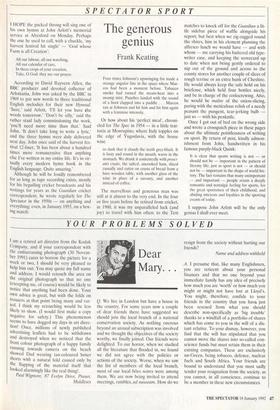SPECTATOR SPORT
The generous genius
Frank Keating
I HOPE the packed throng will sing one of his own hymns at John Arlott's memorial service at Alresford on Monday. Perhaps the one he used to call, with a chuckle, 'my harvest festival hit single' — 'God whose Farm is all Creation':
All our labour, all our watching, All our calendar of care, In these crops of your creation, Take, 0 God: they arc our prayer.
According to David Rayvern Allen, the BBC producer and devoted collector of Arlottania, John was asked by the BBC in 1969 to put new words to three traditional English melodies for their new Hymnal. `Sure,' said Arlott, 'I'll let you have the words tomorrow.' Don't be silly,' said the rather staid lady commissioning the work, `you'll need more time than that.' Said John, 'It don't take long to write a lyric,' and the three hymns were duly delivered next day. John once said of the harvest fes- tival 12-liner, 'It has been about a hundred times more remunerative than anything else I've written in my entire life. It's in vir- tually every modern hymn book in the English language. Quite amazing.'
Although he will be fondly remembered for as long as tape recording exists, mostly for his beguiling cricket broadcasts and his writings for years as the Guardian cricket correspondent, he wrote regularly for The Spectator in the 1950s — on anything and everything; even, in January 1955, on a box- ing match:
Four times Johnson's upswinging fist made a strange angular line in the space where Mar- cos had been a moment before. Tobacco smoke had turned the steam-heat into a swamp mist. Punches landed with the sound of a boot clapped into a puddle . . . Marcos ran at Johnson and hit him and hit him again with a feminine intensity.
Or how about his 'perfect meal', chroni- cled for The Spec in 1954 — in a little trat- toria at Monrupino, where Italy topples on the edge of Yugoslavia, with the house wine
so dark that it clouds the teeth grey-black. It is lusty and round in the mouth, warm in the stomach. We drank it contentedly with prosci- utto cluck the salted, uncooked ham, sliced casually and eaten on crusts of bread from a bare wooden table, with another glass of the wine in place of a savoury, and another instead of coffee.
The marvellous and generous man was still at it almost to the very end. In the four or five years before he retired from cricket, in 1980, it was my unparalleled luck (and joy) to travel with him often: to the Test matches to knock off for the Guardian a lit- tle sidebar piece of waffle alongside his report; but best when we zig-zagged round the shires, him in his element planning the alfresco lunch we would have — and with whom — me carrying his battered old type- writer case, and keeping the scorecard up to date when not being gently ordered to nip out of the ground and across to the county stores for another couple of slices of rough terrine or an extra hunk of Cheshire. He would always keep the safe hold on his briefcase, which held four bottles nicely, and be in charge of the corkscrewing. Also, he would be maitre of the onion-slicing, paring with the meticulous relish of a needy peasant the pungent, tear-jerking bulb just so — with his penknife.
Once I got out of bed on the wrong side and wrote a crosspatch piece in these pages about the ultimate pointlessness of writing on sport. By return of post, kindly admon- ishment from John, handwritten in his famous purply-black Quink:
It is clear that sports writing is not — or should not be — important in the pattern of literary life; just as sport is not — or should not he — important in the shape of world his- tory. The fact remains that many unimportant — and important — people retain a deeply romantic and nostalgic feeling for sports, for the great sportsmen of their childhood, and abiding interests and loyalties in the sporting events of today.
I suppose John Arlott will be the only genius I shall ever meet.


















































 Previous page
Previous page